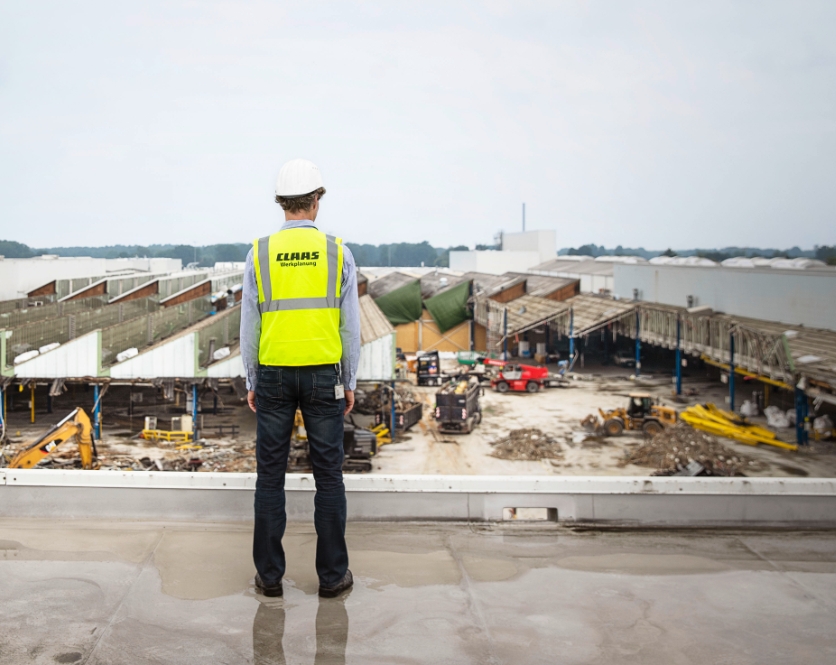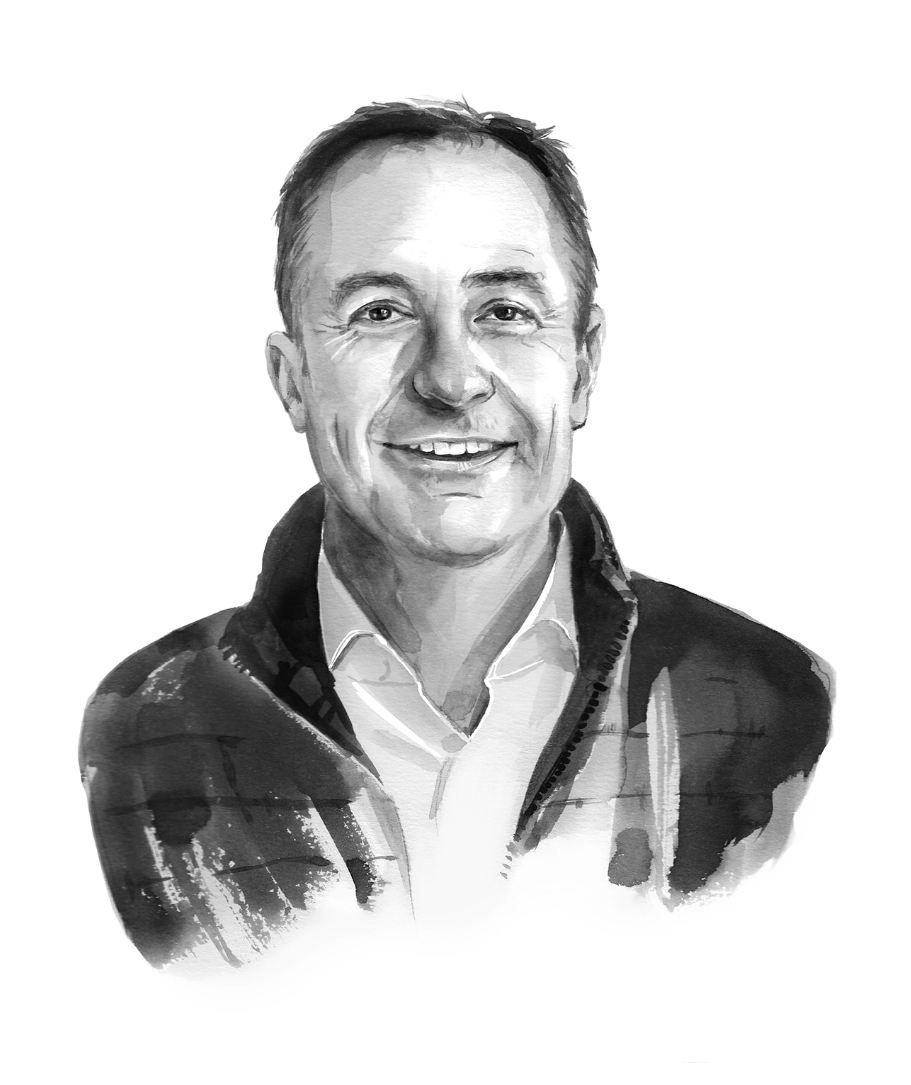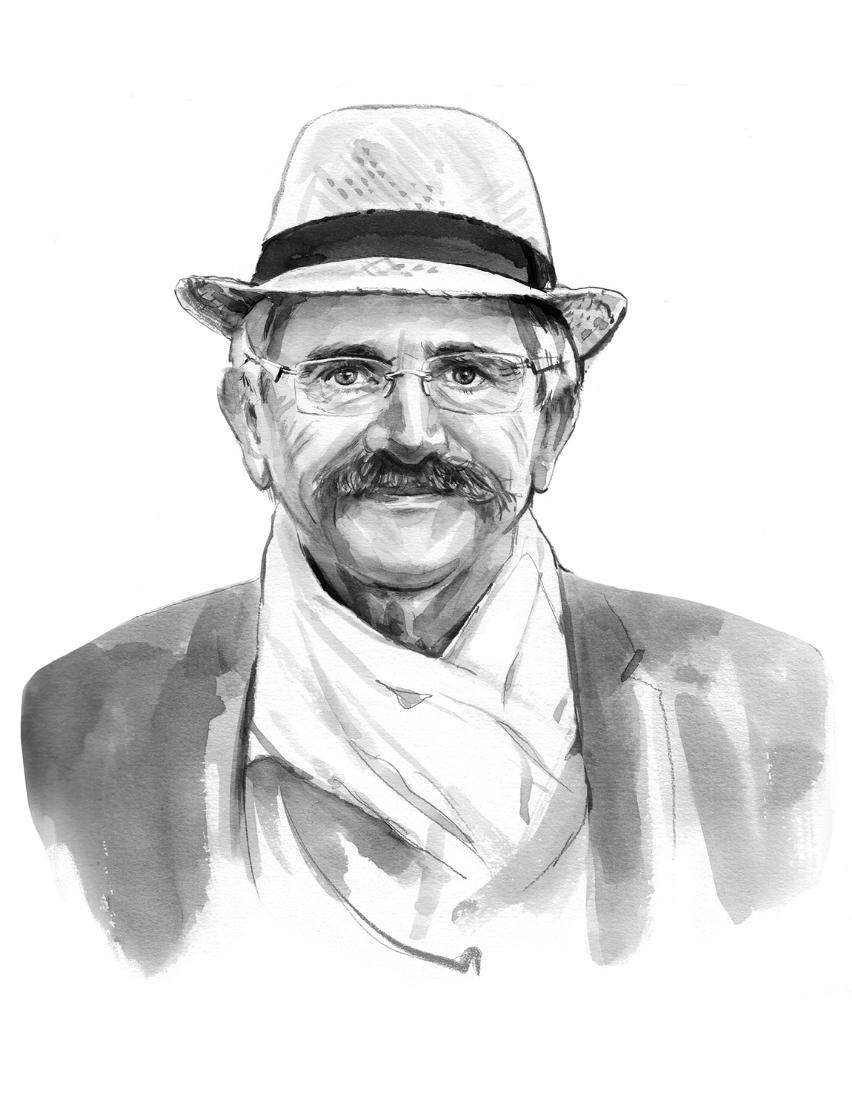
A “Once-in-a-Lifetime” Project
At the CLAAS headquarters in Harsewinkel, a special team is responsible for completing the historic modernization of production.
Read more
The farming industry in France is considered to be one of the most innovative in the world. Hundreds of agritechs are driving forward the transformation needed to respond to major challenges such as demographics, climate change, and environmental protection.
Text: Dirk Böttcher, Alessia Armezzani
= total arable land in France (2019)
of arable land for soft wheat in France in 2019
of arable land for wine growing
Data sources:
The German Farmers’ Association situation report; businesscoot.com
The stereotypical image of France’s agriculture is the purple lavender fields of Provence or the picturesque wine-growing regions of Burgundy. The most important product by far that is cultivated on French soil seems almost boring compared with this picture-perfect idyll: France is the largest wheat producer of the 27 EU member states and ranks sixth worldwide, with just under 29.5 million metric tons recorded in 2020. However, over the last two years, farmers have had to endure painful crop losses: Yields fell in both 2019 and 2020 year on year. They are picking up again in 2021, albeit at a low level. Quality is also suffering: Soft wheat in particular often did not achieve the required grain filling and ended up as fodder. The reasons for the decline in quality and quantity are varied – as are the approaches to improving the situation.
As a result, the calls for more modern equipment are getting ever louder. Farmers in France have some catching up to do – and have already set to work. While horses were often the only “machines” on farms right up until the 1960s, France is today considered one of the most innovative markets with an estimated 250 agri start-ups. Hervé Pillaud embodies this spirit of modernization. The cattle breeder in his 60s, who calls himself the “Digital Evangelist of Agriculture,” has become a minor celebrity in his country as a speaker, author, and blogger. He says: “It’s high time farmers like us befriend technology and turn farming from an input-intensive sector to a knowledge-intensive one.”
Digital technologies in particular could be the key to more profitable and more environmentally friendly farming. This view is shared by La Ferme Digitale, an association of French agricultural start-ups and companies that supports the development of innovative tools for optimizing farm management or cutting production costs, for example. Hervé Pillaud is an honorary member of La Ferme Digitale and well connected. As well as managing his farm in the Loire Valley, he is also chairman of the innovation and research department of the region’s Chamber of Agriculture and, if that wasn’t enough, a member of the National Council for Digital Transformation and president of the Etablières group, an educational institution for farm workers.
Pillaud believes that France has caught up a lot in terms of digitalization and is no longer so far behind the leading nations of Germany and the Netherlands. More than half of the farms in the country are fully digitalized. Those who do not follow suit, Mr. Pillaud said in an interview, will be forced out of the market. He points to some examples that make farms more “dynamic”: “Digital tools help select the most appropriate crop variety depending on the type of field, and drones provide data on the nutrients or water present in the soil and send it to the fertilizers and irrigators to optimize crop health and productivity.”


Agriculture needs to start reaching out to a more horizontal space, where the word cooperation regains its full meaning by including an unprecedented number of stakeholders.”
Hervé Pillaud,
French agricultural technology expert
We try to inform farmers about how to deploy smart technologies and train them in the use of our machines.”
Bruno Chapon,
CLAAS dealer from Hauts-de-France
Supporter of the transformation
CLAAS has committed itself to supporting French farmers with their digital transformation. Bruno Chapon, director of the agricultural machinery dealer Gueudet Agricole, based in Beauvais (Hauts-de-France), works on this task every day. The Gueudet farms are located in the heart of a very large grain-growing area.
Mr. Chapon speaks with great joy about his work. The passionate businessman notes that more and more farmers want to use “smart” technologies, for example special machines to manage plant covers and weeds or GPS-controlled vehicles. “Our job is to support the farmers in this phase,” explains Mr. Chapon and adds: “We offer those who want to use smart agricultural machinery the opportunity to buy or rent new or used CLAAS machines with high-tech equipment.” In Beauvais, powerful tractors are in high demand for the huge grainfields. Thanks to modern control systems, the use of satellites for the geolocation of work processes, and also smartphones, software, and even drones, CLAAS tractors now drive almost autonomously.
As in many other regions, farmers in Hauts-de-France are mainly up against the weather. In 2020 and also this year, above-average rainfall meant that many areas could not be cultivated at all or yielded a poor harvest. In previous years, it was the heat that troubled farmers. In these extreme situations, it is important to work with precision. The CLAAS subsidiary 365FarmNet offers CLAAS Crop View, a monitoring system based on satellite data that provides real-time information on soil condition and vegetation development. In this way, farmers know where in the field and to what extent they need to fertilize or irrigate.
Wave of agritech
Cooperatives such as InVivo, which brings together more than 3,000 businesses, are also taking up these challenges and offering their member farms a wide range of solutions and products, such as Smag software, which today covers around ten million hectares of French farmland and gives farmers access to cross-referenced information on their smartphone about the weather as well as optimal data on fertilizer spraying, seed, fertilization plans, and regulatory compliance. “In France, it is mainly the complicated regulatory requirements that drive the use of software, while elsewhere the technologies are developed more to optimize productivity,” explained Stéphane Marcel, Chief Digital Officer at InVivo, in a recent interview. In addition to accurate mapping of grasslands or previous watercourses, farmers must keep computerized production records, for example.
InVivo also selects seed varieties best suited to each farmer’s soils and sector, increasing productivity and quality while protecting the environment. France is an ideal country for both producing and exporting seed thanks to its versatile climate and its many years of experience in this field.
The other major challenge, the vulnerability of farms to climate change, is being addressed by researchers at the French National Research Institute for Agriculture, Food and Environment (INRAE). As an example, scientists at INRAE in Toulouse are investigating tactics for coping with extreme weather events, simulating the production of feedstuff for the next 30 to 50 years and correlating this with the weather forecasts from Météo France. Initial results indicate that there will be significant fluctuations in yields within and between 12-month periods.
Supporting the new generation
CLAAS is involved in many of these activities. “We try to inform farmers about how to deploy smart technologies and train them in the use of our machines,” explains dealer Bruno Chapon. Sometimes farms lack this expertise, especially because vocational training is mainly focused on mechanics and not on the use of digital tools, he says. In his own company, Chapon trains the students himself. He is also concerned with passing on his philosophy: “We are always on the lookout for innovations, and we know that CLAAS shares this mindset.” The latest CLAAS machines are now equipped with a remote maintenance service, for example, for quick and direct access.
To enable it to continue to shape the transformation in agriculture in the future, but also to initiate this transformation itself, CLAAS launched a comprehensive modernization and digitalization of its own tractor production in Le Mans in May this year. The “Future Factory” project will be completed in three years. After that, up to 13,000 tractors of the AXION and ARION series will be built per year in the new factory, using autonomous vehicles in production and augmented and virtual reality to visualize the entire production process at all times.
To finish with the words of Mr. Pillaud: “Change is inevitable. Agriculture needs to start reaching out to a more horizontal space, where the word cooperation regains its full meaning by including an unprecedented number of stakeholders. Agriculture needs to rediscover its basic principles by prioritizing collective and collaborative work and starting to use technologies to mobilize collective intelligence.” Citing demographics, climate change, and environmental changes as the three major challenges of this century, he says: “Agriculture in its diversity will be at the center of these challenges.”